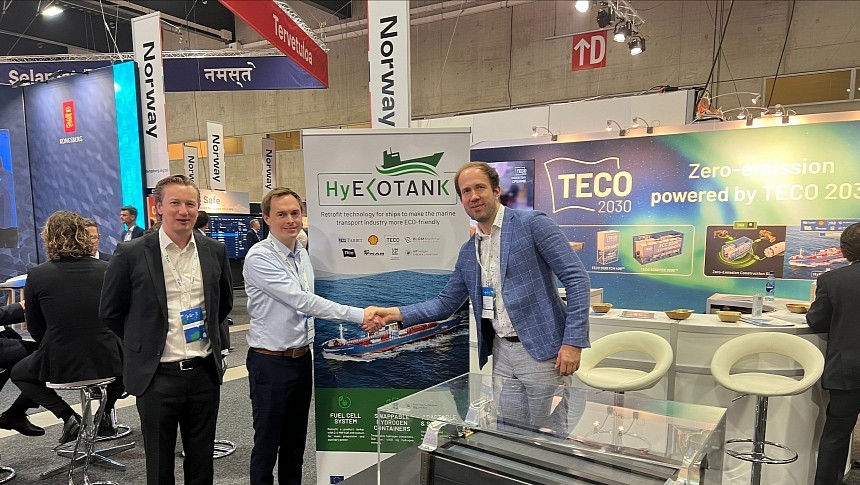A Norwegian fuel cell expert, TECO 2030 and Shell are the main partners in a large-scale consortium that will deliver what claims to be the world's largest marine fuel cell retrofit project. The future HyEkoTank vessel will also pack SuperBattery modules developed by Skeleton Technologies.
Europe is betting on renewable hydrogen for decarbonizing shipping. Judging by the numbers, this transportation sector is responsible for a small chunk of overall emission levels. Still, because of its crucial role in international commerce, it has strategic importance.
One of the projects funded by the European Union in this field is the HyEkoTank, under the Horizon Europe program. The focus is on hydrogen fuel cell systems specifically developed for waterborne transport.
TECO 2030, an Oslo-based clean technology company, announced this project last summer. Together with the other members of the consortium (including Shell Shipping and Maritime), it would install a hydrogen fuel cell system on an Ektank AB tanker (the company that would operate the retrofitted ships).
The project was officially launched earlier this year, in February, and will last for three years. The vessel that was selected in the end is the Bitumen carrier tanker BiFlower. The Norwegian company will install a 2.4 MW fuel cell system and a swappable storage system for 350 bar, 4,000 kg (8,800 lb) of hydrogen. The final package includes air filtration systems, power converters, an automation system, and battery storage.
The HyEkoTank ship is also getting battery modules – not just any batteries, but the SuperBatteries developed by Skeleton Technologies. Skeleton uses a proprietary raw material called Curved Graphene to develop high-performance battery cells with an extended lifetime and enhanced safety.
These SuperBatteries claim to combine the best of supercapacitors and conventional batteries. They're fully charged in just 60 seconds and promise 50,000 life cycles, which would be ten times better than Lithium-Ion batteries. They can be used for various hybrid and fuel cell vehicles, and they're made without cobalt, nickel, or copper, making them more sustainable.
Using the combined power of TECO 2030's fuel cell technology with Skeleton's SuperBattery modules is supposed to drastically reduce GHG emissions in the maritime sector. This retrofit project is only the beginning, aiming to demonstrate the efficiency of fuel cell technology for ships. In the future, it could be implemented on a variety of vessels, existing or newly built.
The Norwegian company is also building a fuel cell gigafactory in the country. Set to open its gates next year, it will be the first one of its kind in Norway. TECO 2030 hopes to reach an annual capacity of 1,600 MW fuel cells by the end of this decade. Around the same time, we might see the first hydrogen fuel cell commercial ships in operation.
One of the projects funded by the European Union in this field is the HyEkoTank, under the Horizon Europe program. The focus is on hydrogen fuel cell systems specifically developed for waterborne transport.
TECO 2030, an Oslo-based clean technology company, announced this project last summer. Together with the other members of the consortium (including Shell Shipping and Maritime), it would install a hydrogen fuel cell system on an Ektank AB tanker (the company that would operate the retrofitted ships).
The project was officially launched earlier this year, in February, and will last for three years. The vessel that was selected in the end is the Bitumen carrier tanker BiFlower. The Norwegian company will install a 2.4 MW fuel cell system and a swappable storage system for 350 bar, 4,000 kg (8,800 lb) of hydrogen. The final package includes air filtration systems, power converters, an automation system, and battery storage.
The HyEkoTank ship is also getting battery modules – not just any batteries, but the SuperBatteries developed by Skeleton Technologies. Skeleton uses a proprietary raw material called Curved Graphene to develop high-performance battery cells with an extended lifetime and enhanced safety.
These SuperBatteries claim to combine the best of supercapacitors and conventional batteries. They're fully charged in just 60 seconds and promise 50,000 life cycles, which would be ten times better than Lithium-Ion batteries. They can be used for various hybrid and fuel cell vehicles, and they're made without cobalt, nickel, or copper, making them more sustainable.
Using the combined power of TECO 2030's fuel cell technology with Skeleton's SuperBattery modules is supposed to drastically reduce GHG emissions in the maritime sector. This retrofit project is only the beginning, aiming to demonstrate the efficiency of fuel cell technology for ships. In the future, it could be implemented on a variety of vessels, existing or newly built.
The Norwegian company is also building a fuel cell gigafactory in the country. Set to open its gates next year, it will be the first one of its kind in Norway. TECO 2030 hopes to reach an annual capacity of 1,600 MW fuel cells by the end of this decade. Around the same time, we might see the first hydrogen fuel cell commercial ships in operation.







